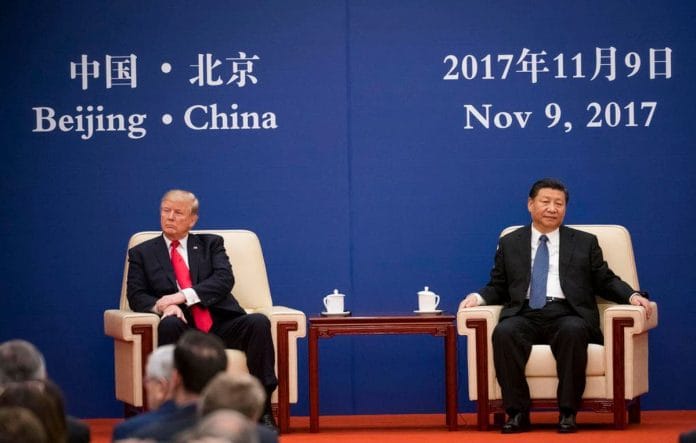India has become a focal point in Chinese diplomacy, shaped by both conflict and the necessity of managing bilateral ties. During the press conference at the Third Session of the 14th National People’s Congress last week, Chinese Foreign Minister Wang Yi used the metaphor of “dancing with dragons and elephants” to emphasise that cooperation is the only viable path forward.
Wang’s tone reflected cautious optimism toward India, positioning it as a key player with shared responsibilities in challenging hegemonism and upholding international norms. He suggested that a China-India partnership could foster a more democratic global order and accelerate regional development. Wang Yi’s remarks also signalled China’s response to shifting diplomatic dynamics, particularly in the wake of US President Donald Trump’s “America First” policies, which disrupted the US’ alliances network and forced Beijing to recalibrate its strategy.
This framing aligns with China’s broader effort to engage New Delhi, which is often viewed as a counterbalance to Beijing. By emphasising cooperation, China aims to stabilise bilateral ties while subtly countering the deepening India-US strategic partnership under Trump.
Trump’s role in China’s diplomacy
While China is refining its diplomatic approach, much of it is shaped by the evolving priorities of the US—both as opportunities and challenges. The Chinese news and opinion website Guancha has a section titled Dealing with the Trump Shockwave, analysing the impact of Trump’s policies on China.
Jin Canrong, a professor at Renmin University’s School of International Relations, argues that confrontation with China will remain central to Trump’s second term. In response, he advocates for strategic composure, domestic resilience, and deeper diplomatic ties. He asserts that with China’s productivity now surpassing that of the US, Trump’s policies pose little real threat.
Jin dismisses Trump’s foreign policy as “babble-style”—marked by excessive rhetoric, unpredictability, and a lack of long-term strategy. He argues that despite his aggressive tone, Trump’s policies lack consistency and tangible impact on China’s global standing. Though Trump has been in office for only a few months, many already view his return as more disruptive than his first term’s shockwaves.
Tian Feilong, Vice Dean of Minzu University’s Law School, reinforces this perspective. He contends that Trump’s policies have weakened US alliances, creating an opening for China to position itself as a stable and cooperative global leader. China strengthens its own narrative of ascendance by portraying Trump’s leadership as a force that can ultimately weaken the West.
Diao Daming, Deputy Director of Renmin University’s American Research Center, reasons that in response to the “America First” approach, China should adopt a more unified global role, stabilising its course and leading progress. Similarly, Shanghai Institute of International Studies’ Zhao Long highlights that strengthening ties within the region remains central to China’s diplomacy, particularly through major global initiatives and governance reforms that amplify developing nations’ voices. Meanwhile, Chinese Academy of Social Sciences’ Zhao Chen underscores Wang Yi’s strategy of “seizing the general trend, shouldering great responsibilities, and forging ahead” as a reflection of China’s great power diplomacy. That it can bring stability amid global turbulence.
Also read: ‘All-weather friendship’ with Pakistan is increasingly becoming a liability for China
Turning dilemmas into opportunities
China is also anticipating that US foreign policy will determine how allied nations, particularly US partners, position themselves. Xiang Haoyu of the China Institute of International Studies sees Japan as a case study in this dilemma. By aligning with the US against China, Japan hopes to contain Beijing, but if China-US tensions escalate further, Japan risks becoming collateral damage—a “losing third party”.
Chinese discourse reflects confidence in Beijing’s diplomatic trajectory, whether through head-of-state diplomacy, engagement with emerging economies, or navigating the Trump dilemma. The US’ shifting foreign policy stance is expected to alienate allies further and weaken security guarantees, creating a vacuum that China is eager to fill. Reports already indicate that Beijing is stepping in following the suspension of USAID in various regions—a sign of China’s strategic intent.
China’s diplomacy hinges on its long-term goal of overtaking the US and diminishing its influence. Beijing will do whatever it takes to position itself as a more reliable partner than Washington, and the missteps of Trump’s presidency could offer China the perfect moment for that. There is growing momentum within Chinese discourse calling for Beijing to assume a greater leadership role in global affairs.
Trump 2.0 presents both challenges and opportunities for China. His unpredictability remains a key obstacle. Some in China believe that this time, Trump will engage with China primarily as a businessman—making his policies more transactional and potentially more manageable. More importantly, Washington is alienating allies faster than predicted, leaving a strategic opening for China not just in the region but also in the broader international order.
Sana Hashmi is a fellow at the Taiwan-Asia Exchange Foundation. Views are personal. She tweets @sanahashmi1.
(Edited by Ratan Priya)






